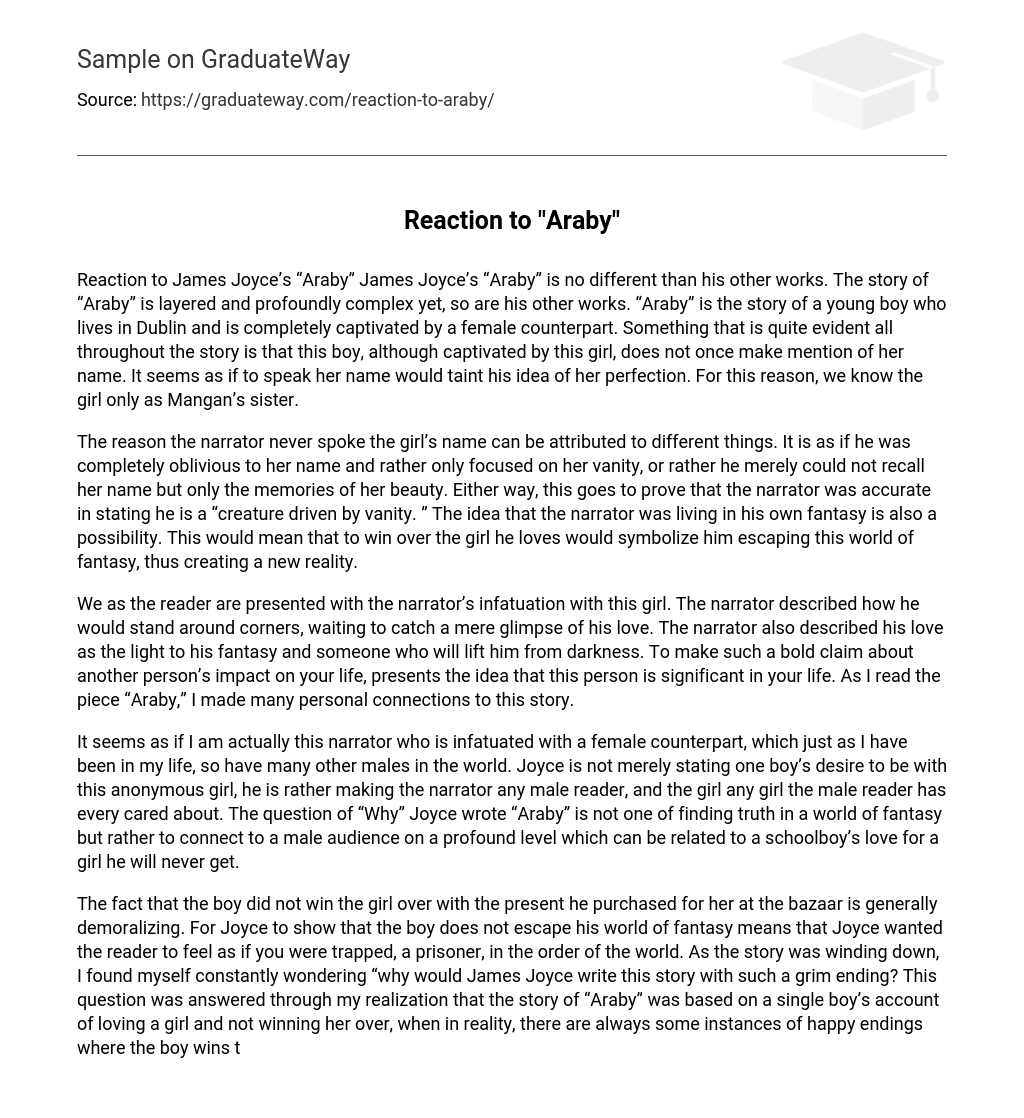Reaction to James Joyce’s “Araby” James Joyce’s “Araby” is no different than his other works. The story of “Araby” is layered and profoundly complex yet, so are his other works. “Araby” is the story of a young boy who lives in Dublin and is completely captivated by a female counterpart. Something that is quite evident all throughout the story is that this boy, although captivated by this girl, does not once make mention of her name. It seems as if to speak her name would taint his idea of her perfection. For this reason, we know the girl only as Mangan’s sister.
The reason the narrator never spoke the girl’s name can be attributed to different things. It is as if he was completely oblivious to her name and rather only focused on her vanity, or rather he merely could not recall her name but only the memories of her beauty. Either way, this goes to prove that the narrator was accurate in stating he is a “creature driven by vanity. ” The idea that the narrator was living in his own fantasy is also a possibility. This would mean that to win over the girl he loves would symbolize him escaping this world of fantasy, thus creating a new reality.
We as the reader are presented with the narrator’s infatuation with this girl. The narrator described how he would stand around corners, waiting to catch a mere glimpse of his love. The narrator also described his love as the light to his fantasy and someone who will lift him from darkness. To make such a bold claim about another person’s impact on your life, presents the idea that this person is significant in your life. As I read the piece “Araby,” I made many personal connections to this story.
It seems as if I am actually this narrator who is infatuated with a female counterpart, which just as I have been in my life, so have many other males in the world. Joyce is not merely stating one boy’s desire to be with this anonymous girl, he is rather making the narrator any male reader, and the girl any girl the male reader has every cared about. The question of “Why” Joyce wrote “Araby” is not one of finding truth in a world of fantasy but rather to connect to a male audience on a profound level which can be related to a schoolboy’s love for a girl he will never get.
The fact that the boy did not win the girl over with the present he purchased for her at the bazaar is generally demoralizing. For Joyce to show that the boy does not escape his world of fantasy means that Joyce wanted the reader to feel as if you were trapped, a prisoner, in the order of the world. As the story was winding down, I found myself constantly wondering “why would James Joyce write this story with such a grim ending? This question was answered through my realization that the story of “Araby” was based on a single boy’s account of loving a girl and not winning her over, when in reality, there are always some instances of happy endings where the boy wins the girl he loves. Contrary to a cliche modern love movie, the story of “Araby” was written in a time where it was difficult for a man to express his feelings to a woman freely and openly. This meant that to win a girl over, it required a male to show his love through the act of buying her a gift, as opposed to today where feelings can be texted between two people.
In the end, my perception changed from this story being about single instance of a boy trapped in a fantasy, who would only be set free by winning the girl he loved, to a story which represented the social construct of male’s as a whole. Men during the time “Araby” was written were prisoners of their feelings and forced to not overstep their boundaries. When the boy does not win the girl in the end, this proves that he too was a prisoner of the social construct during this time.





